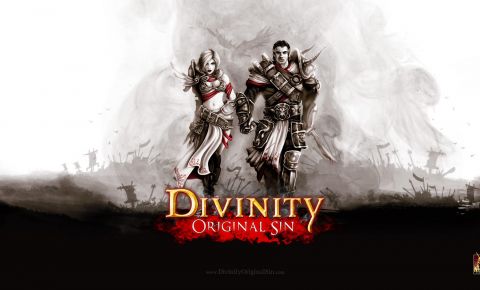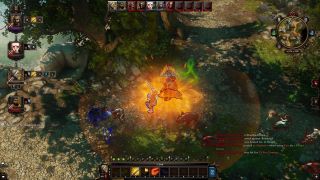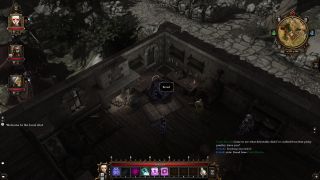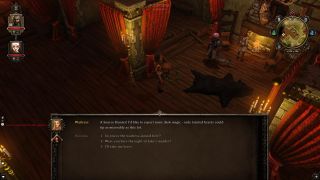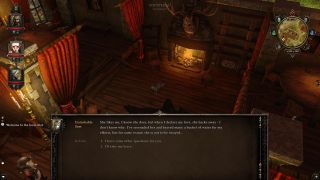An isometric, single-player focused role-playing game that features turn-based combat and has triple-A visuals is nothing to scoff at, but when said title also merges some of the best writing ever seen in games with a deep character progression system, a very interactive world, and a ton of innovative features, it becomes an even more attractive prospect.
Such is the case with Larian Studios’ Divinity: Original Sin, a spiritual successor of sorts to the company’s previous role-playing titles, made possible through the monetary and testing contributions of thousands of fans, which afforded the developers complete creative freedom to create just what they wanted and not to worry about much else.
Granted, such a project is prone to having a few failings, not necessarily due to the fact that an independent game development studio is inherently going to botch things by losing focus of the big picture, making money from as many people as possible, but due to the fact that having creative freedom usually means having a pretty narrow focus and a less than optimal budget, especially when it comes to an undertaking of this magnitude.
However, Divinity: Original Sin is far from being merely “good for a Kickstarter game,” and has its feet firmly planted in the rugged arena of first-class role-playing game experiences, ready to take on any and all competitions. Let’s find out why.
Story
Larian did a pretty good job with the previous Divinity titles, and it does not disappoint with Original Sin. The overarching theme is the endless battle between good and evil, which is a bit trite since we’ve come a long way from Tolkien’s debut in literate fantasy storytelling, but perfectly excusable on account of the top-notch quality of the writing itself and the many surprises that emerge while exploring the game world.
In a nutshell, the game offers a prologue to the story found in the previous installments in the Divinity series, and tasks you with uncovering the mysteries of an esoteric power known as Source (leading to its users bearing the dorky name of Sourcerers), which was outlawed a long time ago but has recently resurfaced in the land of Rivellon.
Like most other role-playing games, Divinity: Original Sin starts off with a party of “lowly” Source Hunters, a duo of adventurers that are tasked with tracking and disposing of evil-doers of the mystical kind, and then enforcing the rule of law upon them.
Of course, in the tradition of classic role-playing game, it also allows you to deviate from the “holier than thou” paradigm and bend the rules to a certain extent in order to realize your goals, which is a nice touch.
It also focuses a lot on choice, which means that when you run into two drunken guards, you have the option to peacefully allow them to take you into custody, which will later translate into some help against a pack of orcs, or resist them and kill the two, which means no help later on but a bit of phat lewt.
This happens a lot during the game, and your actions bear some pretty defining consequences on the world of Rivellon, especially considering the special role you play in the general development of the action, which I don’t want to spoil. Suffice it to say that the mission to embark on is of a much more epic nature than the mere investigation of a murder that involved the arcane arts.
Gameplay
The character creation system is pretty solid, offering a pleasing amount of visual customization options, as well as the choice between several pre-made “classes” or your very own cocktail of abilities and skills, tailored to your preferred play style.
The character appearance options range from kabuki theater to face-tattoo tribesman, also offering some more traditional-looking archetypes, without going into as much detail as MMOs do but providing a satisfying level of variety.
The progression system is somewhat similar to the way Dungeons & Dragons does it, the level cap is set pretty low, and you don’t get a million things to put skill points in, having to rather carefully plan ahead and choose between deeper specialization and a much broader toolset that comes at the price of less raw power.
This is an area where being able to put together a party of characters really shows its usefulness, as you can acquire companions that neatly fill the niches you lack proficiency in, in order to provide a more well-rounded experience and increase your odds of coming through with your adventure.
There are a lot of things that are easily recognizable from classic PC role-playing games, and the game’s design, from the character progression system to the way menus are organized, shows a certain familiarity with the way things used to be done, and in most cases it also suggests an obvious improvement, kind of like the way you wanted things to be when playing Baldur’s Gate.
The improvements in the interface and the more streamlined systems are definitely a step forward, but I would have liked Divinity: Original Sin to take things even further than that. Although its old-school dedication to providing a difficult experience that doesn’t constantly hold your hand is commendable, there are some areas where developer Larian could have done a better job.
There are no quest markers, for instance, and no arrows pointing you in the right direction, and the game tasks you with putting the various clues together and figuring out your next step, which is most of the time a pretty straightforward matter, and there are few occasions on which the flow of your adventure feels forced, the overall design being pretty organic for the most part.
But the bad thing is that there is no proper system to chronicle your interactions and to store the relevant information built into the game, so you have to pretty much memorize everything or write down the info outside the game. While that was something that I was used to while playing Might and Magic III or Ultima Underworld, there is no denying that a built-in advanced information management system that would allow you to zoom maps and take tiny notes or the option to automatically have every known NPC’s position / role / relevance jotted down by default would have made the game even better.
That being said, the interface is one of the friendliest and most helpful ones in role-playing games, offering you plenty of data such as ability prerequisites, penalties or bonuses incurred and the causes for that, and other such things.
You can also sort your inventory to only show certain types of items, which turns out to be incredibly useful when you’re trying to find the right type of curse to throw at someone’s head and you don’t want to be bothered with all the shiny trinkets you’ve hoarded so far.
The feature is a godsend, as Divinity: Original Sin also features a pretty complex crafting system that requires you to keep track of a bunch of different ingredients, reagents, utensils and recipes.
And that’s because the game features a ton of different interactions that were not seen in other games before, at least not at this level. You can throw a barrel of oil in the middle of a group of adversaries, and have them slowed by the sticky goo, just before shooting a fireball that sets them all on fire.
If you find that some of the friendlies also caught on fire, you can always simply cast a rain spell and douse them, and then proceed to electrocute the now-more-susceptible enemies or freeze the water and make them stumble to the ground.
You can smash through most locked doors in case you don’t have a rogue along for the ride, you can teleport enemies off cliffs, you can lie and cheat your way through the game in order to achieve your goals, and so on.
It can’t be said that you don’t have enough freedom, and although the world isn’t exactly open, and you have to follow a certain path, there is just so much to do inside the game that it won’t even matter.
The characters you meet along the way are also pretty savory, maybe they’re not all on par with the ones from Baldur’s Gate, but they’re definitely adding to your experience, whether they are NPCs that you casually brush against with during your journey or the companions that assist you in your mission.
Combat is a pretty complex affair, where you will often find yourself outnumbered, but fortunately the AI is not that stellar, otherwise you would be hard pressed to make any progress. As such, the highest priority target is not always the one getting focused, but it’s still difficult enough to make you find creative ways to use the environment and to make it seem like dragging an explosive barrel all the way from town is a worthwhile effort.
As in any high-fantasy role-playing game, there are a lot of abilities to make use of, divided into different schools of magic and physical combat, offering a very wide assortments of curses, buffs, direct damage and area of effect spells, as well as a few more creative manners in which to deal with incoming aggression.
The fact that all battles are turn-based introduces an additional layer of strategy to encounters, in the form of the traditional mechanics that govern action points use, attacks of opportunity, backstabbing, flanking and other bonuses derived from the characters working together as a party, such as everyone feeling more inspired by the presence of a leader.
There is a lot of combat during the adventure, but there are also a lot of reading, a lot of side quests, and a ton of secrets and Easter eggs to be unearthed, such as searching through a haystack and finding a needle, or stumbling upon a group of generic zombies, only one of them proudly wearing the name Rob.
The quests are also pretty good, aside from the standard fetching ones, most of them entail some exploration or some sort of comedic intermezzo, and they never feel like the MMO industry standard “kill ten rats, none of which have spleens” type
There are also a lot of unexpected events going on around you, and you’ll constantly be surprised by something new, making for a world that feels genuinely alive and that offers you a wealth of content to enjoy, from simple wisecracks and talking to animals and experiencing their very flavorful mannerisms, to uncovering a slew of ancient secrets and deadly conspiracies.
Visuals and sound
The world has an incredible amount of sheen, everything looks gorgeous, from particle effects to subtle motion blur, Divinity: Original Sin is a feast for the eyes. While there still are a few other role-playing games out there that offer the same kind of old-school gameplay it does, none of them gets even remotely close to the visual fidelity of Larian’s project.
It’s probably the best-looking turn-based role-playing game ever made, from detailed character models and movement animations, to the gorgeous spell casting and visual effects that feel downright epic, the game never lets down when it comes to shine.
In addition to this, the level design itself is pretty solid, with surfaces going up and down, not merely content with being flat, especially when you’re wandering outside settlements. The world is painstakingly detailed and there is plenty of life in it, as well as a wealth of decorative objects and a ton of surprises, all masterfully rendered.
To complement the amazing graphics, Larian also put together a truly majestic orchestral score for Divinity: Original Sin, heavy on strings and with a classical overall feel, but also incorporating a ton of different musical styles to suit the mood and location.
Voice acting is another area where Divinity: Original Sin scores a lot of points, as most of the spoken lines of dialogue sound congruent with the expectations and the looks of the character in question, and are delivered spot-on, in a convincing manner that conveys nuance and intent. The only critique here is that there is a lot of dialogue that isn’t voiced out, which, although understandable given the sheer amount of text written for the game, is still a bit disappointing. Conclusion
Divinity: Original Sin is not perfect by any means, but it attempts to reach perfection nonetheless and offers one of the most complex role-playing game experiences currently available. Developer Larian still has a lot of work ahead, primarily in the form of patches that iron out its various kinks, mainly of technical nature, but it’s definitely a very polished experience as it stands.
The game can be critiqued from many perspectives, there are imbalances as far as the “classes” go, and various other areas that are a tad lacking, such as the artificial zoning, with high-level zombies and orcs preventing you from leaving town without losing your life, but not actually attacking the seemingly vulnerable city.
Divinity: Original Sin feels a bit overwhelming at first, because of its sheer size and the scope it managed to achieve, but it also feels a tad underwhelming. You are supposed to be a famed Source Hunter, yet your combat prowess is somewhere around the level of a lowly Legion member; if you’re a rogue then good luck finding lockpicks in the entire city and never mind the fact that you could have brought some along with you for the journey.
In a similar fashion, there are a lot of pretty contrived elements, such as not being able to find a shovel in an entire town, in spite of the fact that graves have been clearly dug pretty recently, and wooden doors that you can break three halberds on without managing to smash through, but to pay them importance is in a way to lose sight of the fact that this is simply a game, and one that makes several steps, if not leaps, in the right direction.
The writing, arguably the most important part of any role-playing game, is solid and surprising, humorous at times, and full of gravitas when the action calls for it; there is a ton of innovation as far as the character system goes, which also translates into gameplay mechanics, the interactions with the game world are rich and rewarding, and there is overall a lot of thinking involved in playing through it.
It might have its limitations, but it’s still probably the best modern rendition of a classic PC role-playing game, one that is born out of love, and one that will surely stoke long-dormant passions for the genre, as well as spark some new ones.
 14 DAY TRIAL //
14 DAY TRIAL // 